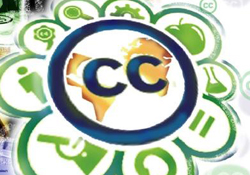
Digital metamorphosis of copyright

This work is licensed under a
Creative Commons Attribution-ShareAlike 3.0 Serbia License.
Motives and effects of publication and usage of copyrighted or related content are increasingly subject to doubts and debates, while the technologically advanced media scene is being constantly exposed to out-of-control vanity and aggressive stereotypes. In the the reality that has been transformed by technology, desires and habits are being changed, life is becoming more active and the world more interactive, while existing legal solutions are not always capable of expressing and protecting the authentic interests of the creative community. The online age has deepened the traditional dilemmas and challenges, but at the same time created new concepts and new solutions.
The first legal advancement, in the form of open software licenses, has reformed the software industry, improved the software competition and allowed universal and unhindered application of continued software innovations in everyday life, while the second advancement has defined limitations of traditional mechanisms for sharing of various creative contents in accordance with the possibilities and requirements of the modern age. The creation of the Creative Commons (CC) legal standardization through international legal expertise has introduced a simple, online, free and quick way to allow sharing of content based on recognized authorship and alternative economic variations of the copyright law.
The CC innovation entails digital legal standards that serve to license content by selecting and possibly combining various conditions for future usage of the content: (non)commercial, with or without derivative works allowed, and share alike under the same license, individually and directly from an online CC platform, after which designation of the chosen license in the content itself completes the process of licensing. The selection and combining of license conditions depends only on the free will of the author or any other issuer of the license (the owner of the copyright), while licenses themselves constitute valid legal instruments that are used to exercise and protect the copyright and related rights worldwide, in accordance with domestic and international regulations.
Designation of content using CC licenses is not only a formality, but serves to integrate the licensed content into the World Wide Web, and as soon as the content appears online, its license clearly specifies the rights of each potential user as well as their obligations with regard to recognition of authorship, attribution of publisher and other required conditions related to the manner of usage of the content.
In comparison with the traditional, time-consuming, complicated, monotonous and rigid procedure, this digital and legal methodology of licensing offers a possibility of selecting degrees of usage of content, without bureaucratic limitations. In order to make it easier to understand, more applicable and more independent from unnecessary legal interventions and inappropriate interpretations, the licensing methodology offers online information in the form of Frequently Asked Questions, detailed instructions and specific licensing explanations (Commons Deed).
Thanks to its diversity and adaptability, the CC licenses are used in media critique*, theory, archiving, news and video production, as well as in the PR and international wiki and civic journalism practice. Their rising popularity is not a result of their perceived perfection and universal absence of problems, but of genuine needs of the present and true and useful potential offered by the cyberspace.
Nevenka Antic
* Prof. Lawrence Lessig has bridged the gap between the legal and creative forms by creating the first CC licenses.
MC Newsletter, July 29, 2011
View all comments (0) Leave a comment
Published comments contain opinions that are not the opinions of Media Center. Responsibility for the content of messages and their accuracy lies on the website users who posted them.






